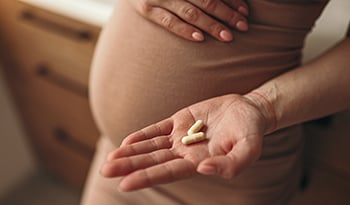Suplemen untuk Menyokong Kehamilan Sihat

Oleh Eric Madrid MD
Tiga trimester kehamilan menetapkan tahap kesihatan bayi. Apabila embrio menjadi janin, dan organ mula berkembang sepenuhnya, pemakanan yang diterima oleh bayi dari ibunya boleh menjejaskan segala-galanya dari kekuatan jantung hingga penglihatan. Selama bertahun-tahun, ramai yang tertanya-tanya apa suplemen, jika ada, harus diambil melebihi vitamin pranatal .
Tiga kajian penting, yang memberi tumpuan kepada pengambilan suplemen tertentu, telah diterbitkan pada tahun 2018 memberikan gambaran mengenai soalan-soalan ini.
Dalam kajian Februari 2018, penyelidik dari Johns Hopkins School of Public Health di Baltimore, Maryland melakukan meta-analisis menilai kesan epada risiko masa depan kanak-kanak mengalami alahan atau penyakit autoimun berdasarkan tiga faktor: diet ibu semasa kehamilan, menyusu status, dan penggunaan suplemen tertentu yang diambil semasa kehamilan.
Dalam kajian ini, penyelidik menilai beratus-ratus kajian dari tahun 1946 hingga 2017, yang merangkumi lebih dari 1.5 juta peserta. Inilah yang mereka dapati:
Probiotik boleh membantu mengurangkan risiko ekzema
Sembilan belas kajian menilai penggunaan probiotik ibu semasa kehamilan dan semasa tempoh penyusuan. Hasilnya menunjukkan bahawa anak-anak ibu yang mengambil probiotik 22 peratus kurang berkemungkinan mengalami ekzema jika dibandingkan dengan ibu-ibu yang tidak mengambil probiotik. Di seluruh dunia, dianggarkan sehingga 20 peratus kanak-kanak mempunyai ekzema, yang boleh berkisar dari ringan hingga teruk bagi banyak orang.
Minyak ikan boleh membantu mengurangkan risiko alergi telur
Enam kajian menilai suplemen minyak ikan semasa mengandung dan menyusu. Hasilnya menunjukkan bahawa kanak-kanak ini 31 peratus kurang berkemungkinan mengalami alahan telur jika dibandingkan dengan ibu-ibu yang tidak mengambil minyak ikan. Sehingga 2.5 peratus kanak-kanak mempunyai alahan telur, yang mungkin atau mungkin tidak berkurang seiring bertambahnya usia kanak-kanak.
Para saintis menyimpulkan bahawa penyusuan susu ibu dapat mengurangkan risiko mengembangkan diabetes jenis 1, keadaan autoimun yang sering memerlukan penggunaan insulin sepanjang hayat dan boleh memberi kesan jangka panjang terhadap kesihatan organ.
Minyak ikan boleh membantu mengurangkan risiko asma kanak-kanak
Kajian lain yang diterbitkan pada bulan Februari, 2018 dalam Journal of Family Practice menunjukkan bahawa suplemen minyak ikan semasa trimester ketiga (13 minggu terakhir) kehamilan dapat membantu mencegah asma kanak-kanak. Para penyelidik menyatakan anak-anak ibu yang ditambah dengan minyak ikan mempunyai risiko asma yang lebih rendah antara usia tiga hingga lima tahun jika dibandingkan dengan anak-anak yang ibunya mengambil pil plasebo.
Selanjutnya, diperhatikan bahawa dos sekurang-kurangnya 2,700 mg sehari perlu diambil untuk melihat faedah ini. Dos harian 900 mg minyak ikan tidak mencukupi untuk mencegah asma kanak-kanak .
Jika anda fikir penggunaan ikan akan menjadi alternatif yang sesuai, fikirkan lagi. Wanita hamil dinasihatkan untuk mengelakkan ikan yang tinggi merkuri kerana risiko kemudaratan janin. Pentadbiran Dadah Persekutuan (FDA) mengesyorkan 2-3 hidangan ikan merkuri rendah setiap minggu.
Ikan rendah merkuri dan boleh diterima untuk dimakan semasa kehamilan termasuk:
- Tilapia
- Salmon
- Kod
- Ikan keli
- Tuna (cahaya kalengan)
Ikan yang harus dielakkan semasa mengandung termasuk:
- Ikan pedang
- Jerung
- Ikan tilefish
- Ikan tenggiri
Vitamin D dan kemurungan selepas bersalin
Kajian Mei 2018 dalam Journal of Affective Disorders menunjukkan bahawa wanita hamil dengan tahap vitamin D yang lebih rendah dalam darah mereka lebih cenderung mengalami kemurungan selepas melahirkan. Wanita hamil harus mempertimbangkan untuk menambah 1,000-5,000 IU setiap hari vitamin D.
Makanan tambahan semasa kehamilan
- Vitamin pranatal - seperti yang diarahkan pada label
- Probiotik - 5 bilion hingga 60 bilion unit setiap hari
- Minyak ikan Omega-3 - sekurang-kurangnya 2,700 mg sehari dinasihatkan
- Vitamin D - 1,000 hingga 5,000 IU setiap hari
Penafian: Jika anda hamil, berunding dengan pakar obstetrik anda sebelum mengambil sebarang suplemen.
Rujukan:
- Garcia-Larsen V, Ierodiakonou D, Jarrold K, et al. Diet semasa kehamilan dan bayi dan risiko penyakit alergi atau autoimun: Kajian sistematik dan meta-analisis. Basu S, ed. PLoS Perubatan. 2018; 15 (2): e1002507.
- http://www.mg217.com/your-eczema/statistics/
- Neutze D, Evans KL, Koenig M, Castelli G, Mounsey A, Stevermer JJ. PURLS: Adakah minyak ikan semasa kehamilan membantu mencegah asma pada kanak-kanak? Jurnal Amalan Keluarga. 2018; 67 (2): 100-102.
- Kajian sistematik mengenai hubungan antara biomarker pemakanan ibu dan kemurungan dan/atau kegelisahan semasa kehamilan dan selepas bersalin Trujillo, Janet et al. Jurnal Gangguan Afektif , Jilid 232, 185 - 203
PENAFIAN:Hab Kesejahteraan ini tidak berhasrat untuk memberikan diagnosis...





























































































